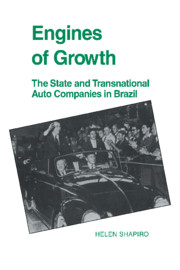Book contents
- Frontmatter
- Contents
- Tables and Figures
- Acknowledgments
- 1 Approaches to State Intervention
- 2 Why Auto?
- 3 The Determinants of Firm Entry
- 4 Rent Redistribution and Linkage Effects
- 5 The Automotive Parts Sector
- 6 Conclusion
- Appendix A Data Exhibits on the Brazilian Auto Industry
- Appendix B José Almeida's Calculation of Subsidies Provided to the Brazilian Automotive Industry
- Index
6 - Conclusion
Published online by Cambridge University Press: 11 September 2009
- Frontmatter
- Contents
- Tables and Figures
- Acknowledgments
- 1 Approaches to State Intervention
- 2 Why Auto?
- 3 The Determinants of Firm Entry
- 4 Rent Redistribution and Linkage Effects
- 5 The Automotive Parts Sector
- 6 Conclusion
- Appendix A Data Exhibits on the Brazilian Auto Industry
- Appendix B José Almeida's Calculation of Subsidies Provided to the Brazilian Automotive Industry
- Index
Summary
In 1984, a party was given to commemorate the publication of a new book on Brazil's early motor vehicle industry by Sydney Latini, a former secretary of the Executive Group for the Automotive Industry (GEIA). Lúcio Meira, who had directed the GEIA program in the 1950s, took the opportunity to apply historical lessons drawn from that experience to Brazil's current economic problems. Addressing the small gathering at the auto salon in Sāo Paulo, with the annual automotive show in the background providing silent testimony to the legacy he bequeathed, he blasted the government for abdicating its responsibility to the private sector. Describing GEIA as a model of government planning and public–private cooperation, he called for the formation of new GEIAs to confront the problems of the 1980s and to reproduce that heroic effort of the past.
The preceding chapters have shown that GEIA was not solely responsible for the implantation of the auto industry in Brazil, but that a combination of factors led to the success of its program. First, it was shown how GEIA's chances of success were increased by the fact that a strictly economic argument could be made in defense of the industry's establishment. The insights of the strategic trade literature, which defends protectionism to construct new industries characterized globally as oligopolies, were applied with a twist to the Brazilian case. That literature concerns itself with the international distribution of rents between countries, presuming that the new infant industries are domestically owned.
- Type
- Chapter
- Information
- Engines of GrowthThe State and Transnational Auto Companies in Brazil, pp. 217 - 234Publisher: Cambridge University PressPrint publication year: 1994



